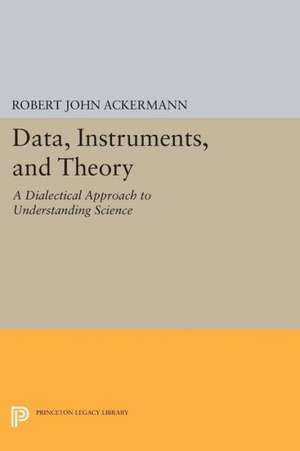Data, Instruments, and Theory – A Dialectical Approach to Understanding Science: Princeton Legacy Library
Autor Robert John Ackermannen Limba Engleză Paperback – 30 iun 2014
| Toate formatele și edițiile | Preț | Express |
|---|---|---|
| Paperback (1) | 287.26 lei 6-8 săpt. | |
| Princeton University Press – 30 iun 2014 | 287.26 lei 6-8 săpt. | |
| Hardback (1) | 572.17 lei 6-8 săpt. | |
| Princeton University Press – 18 apr 2016 | 572.17 lei 6-8 săpt. |
Din seria Princeton Legacy Library
-
 Preț: 437.79 lei
Preț: 437.79 lei - 16%
 Preț: 2324.11 lei
Preț: 2324.11 lei -
 Preț: 223.24 lei
Preț: 223.24 lei -
 Preț: 313.18 lei
Preț: 313.18 lei - 23%
 Preț: 780.26 lei
Preț: 780.26 lei -
 Preț: 376.99 lei
Preț: 376.99 lei - 16%
 Preț: 915.48 lei
Preț: 915.48 lei -
 Preț: 377.31 lei
Preț: 377.31 lei - 16%
 Preț: 882.80 lei
Preț: 882.80 lei - 16%
 Preț: 736.40 lei
Preț: 736.40 lei - 16%
 Preț: 860.09 lei
Preț: 860.09 lei -
 Preț: 340.11 lei
Preț: 340.11 lei -
 Preț: 362.12 lei
Preț: 362.12 lei - 16%
 Preț: 683.63 lei
Preț: 683.63 lei -
 Preț: 363.10 lei
Preț: 363.10 lei -
 Preț: 172.27 lei
Preț: 172.27 lei -
 Preț: 340.22 lei
Preț: 340.22 lei - 16%
 Preț: 835.12 lei
Preț: 835.12 lei -
 Preț: 266.84 lei
Preț: 266.84 lei -
 Preț: 317.65 lei
Preț: 317.65 lei -
 Preț: 329.09 lei
Preț: 329.09 lei -
 Preț: 265.73 lei
Preț: 265.73 lei -
 Preț: 260.54 lei
Preț: 260.54 lei -
 Preț: 314.84 lei
Preț: 314.84 lei -
 Preț: 402.66 lei
Preț: 402.66 lei -
 Preț: 464.18 lei
Preț: 464.18 lei -
 Preț: 351.09 lei
Preț: 351.09 lei -
 Preț: 483.81 lei
Preț: 483.81 lei - 19%
 Preț: 500.29 lei
Preț: 500.29 lei -
 Preț: 388.44 lei
Preț: 388.44 lei -
 Preț: 328.48 lei
Preț: 328.48 lei - 23%
 Preț: 742.04 lei
Preț: 742.04 lei -
 Preț: 372.92 lei
Preț: 372.92 lei -
 Preț: 328.70 lei
Preț: 328.70 lei - 19%
 Preț: 505.89 lei
Preț: 505.89 lei -
 Preț: 289.17 lei
Preț: 289.17 lei -
 Preț: 446.25 lei
Preț: 446.25 lei - 19%
 Preț: 575.53 lei
Preț: 575.53 lei -
 Preț: 447.20 lei
Preț: 447.20 lei -
 Preț: 484.19 lei
Preț: 484.19 lei -
 Preț: 271.12 lei
Preț: 271.12 lei -
 Preț: 314.46 lei
Preț: 314.46 lei -
 Preț: 362.51 lei
Preț: 362.51 lei -
 Preț: 307.07 lei
Preț: 307.07 lei - 19%
 Preț: 498.46 lei
Preț: 498.46 lei -
 Preț: 272.27 lei
Preț: 272.27 lei - 19%
 Preț: 458.44 lei
Preț: 458.44 lei -
 Preț: 406.20 lei
Preț: 406.20 lei - 19%
 Preț: 515.73 lei
Preț: 515.73 lei -
 Preț: 428.88 lei
Preț: 428.88 lei
Preț: 287.26 lei
Nou
Puncte Express: 431
Preț estimativ în valută:
54.98€ • 59.75$ • 46.22£
54.98€ • 59.75$ • 46.22£
Carte tipărită la comandă
Livrare economică 21 aprilie-05 mai
Preluare comenzi: 021 569.72.76
Specificații
ISBN-13: 9780691611884
ISBN-10: 0691611882
Pagini: 230
Ilustrații: black & white illustrations
Dimensiuni: 159 x 232 x 13 mm
Greutate: 0.33 kg
Editura: Princeton University Press
Seria Princeton Legacy Library
ISBN-10: 0691611882
Pagini: 230
Ilustrații: black & white illustrations
Dimensiuni: 159 x 232 x 13 mm
Greutate: 0.33 kg
Editura: Princeton University Press
Seria Princeton Legacy Library
Descriere
Descriere de la o altă ediție sau format:
Robert John Ackermann deals decisively with the problem of relativism that has plagued post-empiricist philosophy of science. Recognizing that theory and data are mediated by data domains (bordered data sets produced by scientific instruments), he argues that the use of instruments breaks the dependency of observation on theory and thus creates a r
Robert John Ackermann deals decisively with the problem of relativism that has plagued post-empiricist philosophy of science. Recognizing that theory and data are mediated by data domains (bordered data sets produced by scientific instruments), he argues that the use of instruments breaks the dependency of observation on theory and thus creates a r
